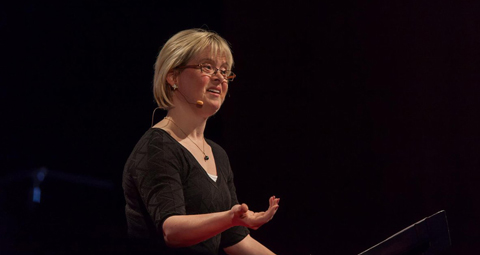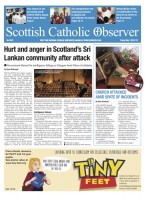BY Amanda Connelly | September 22 | ![]() 0 COMMENTS
0 COMMENTS ![]() print
print

A life with Down’s syndrome is a life worth living
In a revealing interview, AMANDA CONNELLY meets the inspirational Olympic athlete Karen Gaffney
IN the world today, the spotlight falls often on equal rights. There is a push for greater inclusion, and the need for acceptance is on the lips of ordinary people and politicians alike. Yet the abortion statistics for unborn children with Down’s syndrome could be seen to question this supposedly inclusive agenda.
The recent revelation that almost all babies with Down’s syndrome are aborted in Iceland, with other European countries having similarly high statistics, suggests there is an unspoken narrative about the lives of individuals with Down’s syndrome and other developmental disabilities, even today.
Enter Karen Gaffney, the young woman who is changing the face of Down’s syndrome for people across the world.
She boasts an impressive list of achievements to her name: the first person with Down’s syndrome to swim a relay of the English channel, president of her own non-profit organisation, two-time Special Olympics gold medallist, and the first living person with Down’s syndrome to be awarded an honorary doctorate. Indeed, it’s a set of successes that many could only dream of.
“Having Down’s syndrome is just something I was born with,” Ms Gaffney said. “I try really hard to not let it get in my way. I have tried all my life to not let the extra chromosome hold me back. I know it does sometimes, but I try hard to overcome that.”
Ms Gaffney does not shy away from acknowledging that sometimes living with Down’s syndrome can have its difficulties, but she focuses on the many areas in which she very much excels.
“Sometimes it takes me a little longer to learn things than other people,” she said. “But I can and I do learn things. I learn new things every day, especially at my job at Oregon Health Sciences University. I just learn differently.
“There are a lot of things I can’t do that other people can do, like driving a car, running a race, playing tennis or golf, things like that.
“But there are some things I can do that many people can’t do. I swim two miles every day. I can swim very long distances in open water. I have tackled swimming challenges that many people without Down’s syndrome would not be able to do. So I think that’s good!”
She acknowledges the support she has had from her parents throughout her life, who she described as her ‘first teachers’ that helped her be the person she is today.
“They taught me everything I needed to know to do well in school and in life,” she said, with her father teaching her to swim at nine months old, and her mother beginning to teach her to read aged two, and she has ‘never stopped.’
Ms Gaffney is a living testament to the fulfilling existence and many wonderful experiences that those with Down’s syndrome can enjoy—a life that Ms Gaffney wishes to see no child born with Down’s syndrome be denied.
As such, she has not only been a vocal example of the full lives that individuals with Down’s syndrome can lead, but is an advocate for the rights of the unborn child, even addressing a pro-life rally in Ireland earlier this year.
“I think it is important to protect the life of the unborn child whether we have Down’s syndrome or not,” she said. “The unborn child is a living and developing human being who should have the right to be born.
“Even if we have Down’s syndrome, I think we have a right to belong in this world just as everyone else. Don’t abort us even though we have a disability like Down’s syndrome.
“We want to live, and grow and belong in this world, and no one should take that away from us.
“I think the message here is that there is a bright future for people born with Down’s syndrome. We have been able to show what can happen with a good education and with inclusion in families, in schools, in the community and in the work place.
“Everyone wants to belong, everyone wants to be included, regardless of the number of chromosomes you have, right? Well, so many people with Down’s syndrome who have been included have been able to go to schools and have been able to develop their talents. They are showing the world that we can be ‘more alike than we are different’ than everyone else.
“We can live up to our highest potential, and achieve so many things in our lives. Having Down’s syndrome is not the end of the world—look how far we have come from the times where people like me were just sent off to institutions and ignored for our whole lives. We learned that that was wrong, and it is just as wrong to terminate us before we are born.
“We are moving in a direction that terminates people with Down’s syndrome before they are born. Why does that make sense after all this progress? And who gets to take the right to be born away from us?
“We need to be part of life; we need to learn how to make the lives of people like us and people with other disabilities better, not kill us before we are born. How is that a solution to anything? We all need to help each other be better—I think that’s what it means to be human.”
Ms Gaffney spoke of the many achievements of which she is proud: her open water swims, that help people see a ‘different Down’s syndrome,’ the talks and presentations she has given, the swimming advice she gives such as ‘keep your head down and keep moving forward’—advice she feels is good for everyone on life’s journey—and her honorary doctorate.
“I think those are honours that really belong to all of us with Down’s syndrome,” she said. “These honours help the world to see that Down’s syndrome really is a life worth living—a life worth saving!
“And if I can help the world to see that, then I think that is a real achievement.”
Ms Gaffney is the president of her own non-profit organisation, which aims to see the full inclusion of people with developmental disabilities in schools, places of work, and communities.
She gives talks and presentations and various workshops, as well as talking about the importance of regular exercise for those with disabilities, how to set up an exercise programme, her experiences of growing up with Down’s syndrome, the things that helped her while at school, as well as advocating for employment for people with disabilities.
“Probably the most important thing I talk about is that Down’s syndrome is a life worth living,” she concludes. “All lives matter—regardless of the number of chromosomes we have.”










